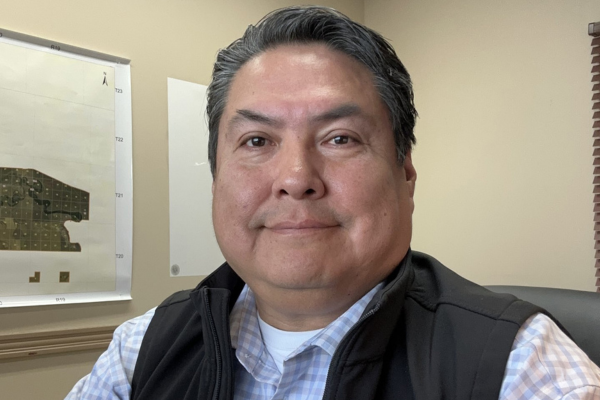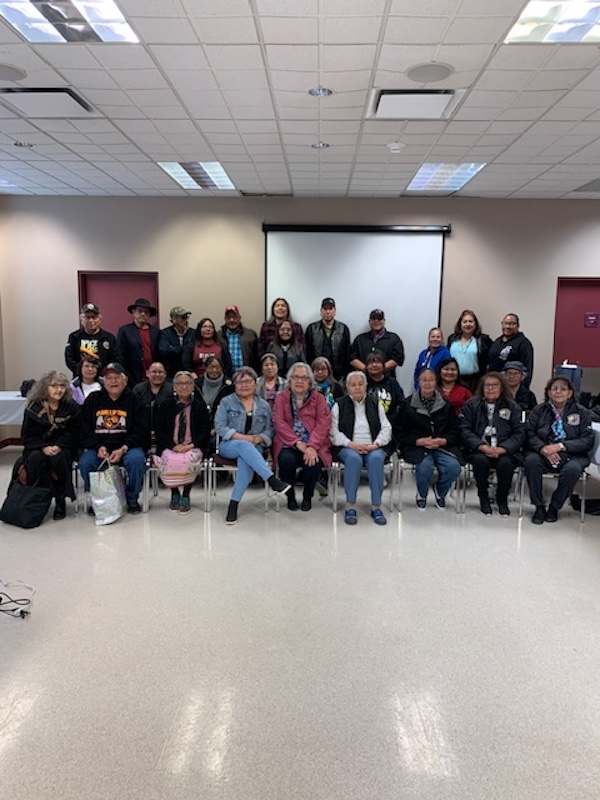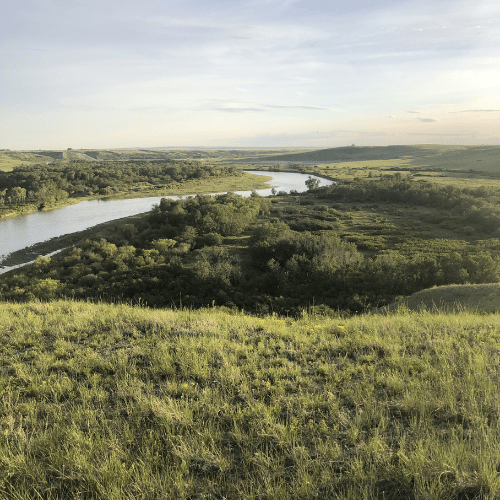By Andrew Breaker
Kyley Melting Tallow is from Siksika Nation; his Blackfoot name is Natoyi Piitaana, which means Holy Eagle Chief, his native name was given by Clarence “Agar” Wolfleg. Kyley is 51 years old, and his parents are the late Casey Melting Tallow and Amie Melting Tallow. Kyley grew up on the reserve; he first lived with his family in Little Washington and moved to the west end area, where they lived for a while before he left for secondary school. Kyley’s father, Casey Melting Tallow, was a police officer who served with the Siksika Nation Police Service, which inspired Kyley to follow in his father’s footsteps and join policing.
Kyley started policing in 1997 with the Siksika Nation Police Service. He had a lot of family in policing around that time. He started his training in Regina in 1997, then was offered a role with the Siksika Nation Police Service, which he held for five years. Kyley has worked with the Tsuut’ina Police Services, a position he had for four years. In 2006, he moved south to the Bloods and joined the Blood Tribe Police Service.
He started off as a constable and continued to move up the ranks from 2006 to 2021, obtaining the rank of Constable, then Sergeant, Staff Sergeant, Inspector, Deputy Chief, and finally Chief of Police. He spent the last five years of his policing career as the Chief of Police for the Blood Tribe Police Service.
“The last five years of my career, I was the Chief of Police for the Blood Tribe Police Service. I looked after the day-to-day management of the place and the direction, a lot of community involvement, and a lot of changes to our practices to reflect the community’s wants, needs, and expectations. It was a great honour to be a part of a lot of situations that allowed us to be tied into the community because typically policing is kind of an oppressive situation where you enforce laws that people do not align with or agree with, but at the same time the rules must be in place.”
It was his work experience that led him back to Siksika to apply for work with Public Safety, support the programs, and improve the relationship between community members and partners. “We want to make sure that we work with the community and promote education before we start issuing tickets and stuff like that, and that is one of the things I wanted to introduce here and make sure we have a really good relationship with our community and community partners.”

Kyley has been a police officer for 24 years before coming back home to his current role as the Public Safety and Justice Manager for Siksika. He oversees the Peace Officers Program, the Security Department, the Animal Services Unit, and the dispatch services that operate out of the Public Safety building. He also oversees the Justice Department and works with the Court workers, Aiskapimohkiiks, and the Elders that follow in that program. They are currently making improvements to the department to make their job a little easier.
Some of that work includes working with the Peace Officers so that they can access the data while they are on the road doing traffic work, upgrading equipment for security, and working with the court to make sure they have the efficiencies and support for what they do in their area. Due to the nature of their work, which includes a lot of work with the community, building confidence in the services they provide is crucial to how the department is run, and part of that is modernizing the department and service areas of Public Safety.
“That first contact is really what the public needs to understand; there’s a lot of information that they need to be provided, but at the same time, make sure that the call is courteous so that way they don’t lose confidence in the process. Then behind that, the folks that have contact with the people in the community by way of dealing with the individual officers, whether they are Animal Services, Security, or Peace Officers, need to be approachable; they need to be understanding of community issues and do their best to solve problems,” adds Kyley.
He goes on to share the work being done with Justice, including renovations to the courthouse, which are currently being done to address the work being done in this area. “Dispute resolution is really key to healing, our community is facing a lot of trauma both in the past and currently and also likely in the future, but it is up to us to try to mitigate that in a way where we are healing together and one of those processes are coming back to our ways of dealing with judicial processes in our court system. We are renovating the courthouse, where we would have the Judge at the same table as the accused person, the victim, and all key players at one table. It is a circular table, and it ties to our culture; we traditionally sat and decided in those forums rather than the traditional court system, where you have the judge ruling over in an elevated position over the preceding and feels like they’re detached, and some people not confident in the court system because of that. So, we’re bringing it in a way of a connection to everything on a common level, and we’re expecting that to have a lot of good results.”
The advice Kyley gives to anyone wanting to pursue a career like his is “to always remember that, even though there are systems in place with training and you get taught a certain way, you need to be kind and empathetic to certain situations and really get away from low tolerance because you do need high tolerance to give people the opportunity to make an impact or to make correct choices.”
Kyley wants to build a strong bond relationship with the community and bring back the ties of what we were once taught back in the days, to heal together and to work together on the Judicial and Public Safety sides of things on the Nation.






